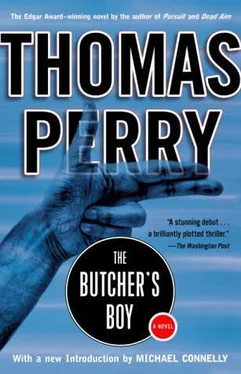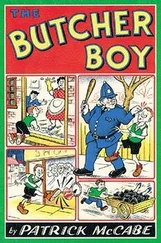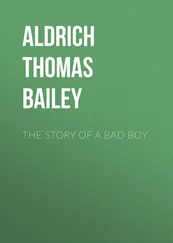“What?”
She leaned into him so her face was close to his ear and said, “They’ve sent someone to meet us.”
Hart said, “I see him. It’s good. Maybe we’ll get this over fast.”
They walked up to him and he said, “Mr. Hart? Miss Waring? Come with me, please.” They followed him, and Elizabeth was surprised to see him open a side door at the end of the tube. Then they were in a small room with an entrance on the other side.
“Right on time,” said the man. “I’m Pete Turnbull, FBI Denver.” He held out his hand for each of them to shake. Elizabeth studied him and decided he couldn’t have been more than twenty-five, but was trying by means of his neat, banker’s blue suit and the serious, competent look on his face to cross the line into the thirties. It made him look precocious, like an overeager junior executive.
“Good to meet you,” said Hart. “What now?”
“I’ll take you to the office, where they’ll fill you in on the case. Give me your baggage tags and I’ll arrange to have your suitcases catch up with you there.”
They handed him the tags, and he disappeared through the other door for a second, then reappeared, smiling. “There’s a car waiting,” he said, and they followed him out the door and down a corridor to the main lobby.
At the big swinging doors Elizabeth felt a gust of cold wind, so she wrapped her light-weight coat around herself tightly and plunged after Turnbull into the open air. In a second they had passed through it into the waiting car, which was parked in a loading zone with its motor running. Turnbull took the wheel and maneuvered them expertly into the circular drive and away.
“What can you tell us about it?” asked Elizabeth.
“The Senator?” said Turnbull. “Not much, really. You’ll get the full rundown. I’m not on it. What I know is he died this morning, early, and was found by his legislative assistant a short time later. That much is in the papers. The rest of it, if there is any more, they’re keeping quiet for now.”
Elizabeth looked at Hart, who seemed to be deeper in thought than the case would warrant. Then he said, in a voice that was too casual for the expression on his face, “Do you know if they’ve ordered an autopsy?”
“I haven’t heard. I suppose they have, though. I know about five agents were put on this case today, and they’re on overtime as of two hours ago, so they’d probably at least do that much.”
Hart’s expression didn’t change. He sat back in the seat and said nothing.
The federal office building was a relic of the era when politicians liked to remind themselves and their constituents that this was, after all, the U.S. government. The building was huge, with lots of Corinthian columns that weren’t there to support anything except the public’s awe and reverence.
Elizabeth and Hart entered through the broad portal, expecting to see the place had been empty since five o’clock. It was true that the dozens of smoked-glass doors off the foyer seemed to be locked up for the night, but there were still people coming and going, and off to the left there were five men who were unmistakably reporters sitting on one of the massive oak benches.
At the far wall was a directory of offices. The FBI was on the second floor, so they walked up the marble staircase. Elizabeth identified what had been nagging at her since she’d seen the place. It was like the buildings in Washington, with everything on a scale larger than people. The railing was too thick for a human hand to grasp, the doorways were at least ten feet high, the benches in the foyer made the reporters look like lost children. It was as though someone had taken great pains to make it clear that this was an outpost of Washington, and by no means a minor one. When they reached the second floor there was no question where they should go next. The cavernous hallway was dark and empty except for a single lighted office at the end.
Inside the office there was a single desk where a receptionist sat during the day. Agent Turnbull ushered them through the outer office and opened the door to a small room with a long conference table, where three men in shirtsleeves were talking across open file folders. Behind her Hart said, “Hello, we’re Waring and Hart.” Elizabeth decided it sounded like a company that sold expensive clothes to British gentlemen.
The men stood up and shook hands while the one at the end of the table said, “This is Bill Greenley. And Joe Mistretta. I’m Mike Lang. Have a seat, and we’ll get you caught up. It won’t take much time, because we don’t know a whole lot yet. I think Bill can do it quickest.”
Greenley was a man in his middle thirties who sounded to Elizabeth to have spent some time testifying in courtrooms. He had seemed a little uncomfortable during the obligatory amenities, and now he launched into his recitation as though it had been prepared and rehearsed in advance. “We’ve placed the time of death between 0630 and 0800 today. There was no one with the deceased at the time, but the Senator’s legislative assistant, Mr. Carlson, came to meet him for breakfast at 0800 and found him dead. The preliminary report from the autopsy says the body temperature was eighty-six degrees at 1000 today, which would mean no more than four hours. Claremont was partially dressed at the time of death.” He added parenthetically, “As though he were getting ready to go to breakfast. The preliminary report contained the observation that the cause of death was heart failure. Not damaged. Just stopped.” Greenley set aside the sheet of paper he’d been looking at and took up another.
“The secondary report indicates that the Senator’s blood contained traces of an unidentified toxic substance, which was probably introduced orally.” Greenley paused to look at Elizabeth and Hart as though he wanted to let his statement blossom in their minds before he pushed on to the next level. “The toxic substance has been determined to be the probable cause of death.”
“Does it have any competition?” asked Hart.
“No,” said Greenley. “No lumps, bruises, cuts, or signs of a struggle. Heart and circulation okay for his age, according to the coroner.”
“Have you got a lab analysis of the substances found in the room yet?”
“They’re still working on it,” said Lang. “But if you mean a simple overdose, I think not. Here’s the list of the stuff they found. The only medicine was aspirin.” He handed a sheet from another file to Elizabeth, who held it so that Hart could read it too: “Rolaids, one roll, unopened. Listerine mouthwash, four-ounce size. Polident, one box, seventeen. Aspirin, Ascriptin brand, one-hundred-tablet size. Empty glass, probably from alcoholic beverage. Glass for soaking false teeth. Deodorant, Mennen stick.”
For the first time, Elizabeth spoke. “Who’s actually in charge of the case? The Denver police?”
“Right,” said Lang. “They knew we’d be interested, and so they called us in at the start. But at least for the moment it’s theirs.”
“What are the ground rules?” asked Hart.
“As close to full cooperation as we can make it. Right now all we’re doing is laboratory work, and they’re doing the rest of it. We’ve agreed to share all information both ways. If somebody finds something that points away from Denver we take over that part of it.”
“What if it turns out to be murder?” said Elizabeth.
“The unidentified toxic substance is making that look like a possibility,” said Lang. “I don’t like it, but there’s no use hiding from it, and that’s why we asked for reinforcements this morning.” Elizabeth and Hart exchanged glances, but Lang continued. “If that’s what it is, we take full responsibility. Assassinating a senator is a federal crime.”
Читать дальше












